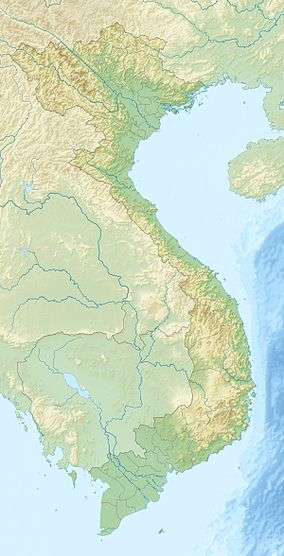Bù Gia Mập National Park
| Bu Gia Map National Park | |
|---|---|
|
IUCN category II (national park) | |
 Location in Vietnam | |
| Location | Dong Nam Bo |
| Nearest city | Đồng Xoài |
| Coordinates | 12°13′N 107°09′E / 12.217°N 107.150°ECoordinates: 12°13′N 107°09′E / 12.217°N 107.150°E |
| Area | 260,32 km2 |
| Established | 2002 |
| Governing body | Bình Phước government |
Bu Gia Map National Park (Vietnamese language: Vườn quốc gia Bù Gia Mập ) is a national park in the province of Bình Phước, Vietnam.
The Bu Gia Map National Park covers an area of 26,032 ha. The park has a 15,200 ha buffer zone area. Until 2002, the area was officially a conservation area, before the incumbent Prime Minister declared it a national park on November 27.[1]
Much of the Bu Gia Map National Park lies in the southern reaches of the Central Highlands. The highest point in the area is 700 meters above sea level. The national park is fed by numerous river systems, including the Dak Huyet and Dak Sam rivers. The headwaters of the hydropower projects of the Thac Mo and Can Don also lie within the park.[1]
Flora
The Bu Gia Map National Park contains a total of 724 plant species. The park has an extensive area of primeval forests. The predominant species here are oil plants, perfumed wood, and rosewood. A total of 278 plant species of medicinal value have been recorded here.[1]
Mammals
In 2000, the Wildlife Conservation Society Cambodia Program and various other organizations survey conducted in the southern Mondulkiri province of Cambodia, an area in the vicinity of the Bu Gia Map National Park. The result was the confirmation of the presence of several globally threatened mammal species. This was taken as a strong evidence for the presence of the same species in the neighboring Bu Gia Map. Some of the important species recorded were black-shanked douc, yellow-cheeked crested gibbon and gaur.[2]
Birds
The avifauna of the Bu Gia Map National Park has not been studied thoroughly, but there is strong evidence for the presence of the Germain's peacock pheasant. The park also has the ideal habitat for the orange-necked partridge.[1]



References
- 1 2 3 4 "Bu Gia Map National Park". iGrandtour Corporation. Retrieved 1 March 2013.
- ↑ "Bu Gia Map National Park" (PDF). BirdLife Indochina. Retrieved 1 March 2013.